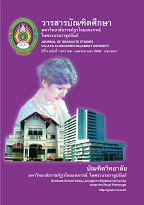การมีส่วนร่วมของประชาชนในการจัดการขยะมูลฝอยในเขตองค์การบริหารส่วนตำบลท่าแค จังหวัดลพบุรี
Main Article Content
Abstract
บทคัดย่อ
การวิจัยครั้งนี้มีวัตถุประสงค์ เพื่อศึกษาเกี่ยวกับระดับการมีส่วนร่วมในการจัดการขยะมูลฝอยของประชาชนในพื้นที่องค์การบริหารส่วนตำบลท่าแค จังหวัดลพบุรี, และศึกษาเปรียบเทียบปัจจัยที่มีผลต่อการมีส่วนร่วมในการจัดการขยะมูลฝอยของประชาชนในพื้นที่องค์การบริหารส่วนตำบลท่าแค จังหวัดลพบุรี จำแนกตามปัจจัยส่วนบุคคล อันได้แก่ เพศ อายุ ระยะเวลาที่อาศัยอยู่ในชุมชน ระดับการศึกษา อาชีพ จำนวนสมาชิกในครัวเรือน ลักษณะที่อยู่อาศัย และการรับข้อมูลข่าวสาร ทำการศึกษาโดยวิธีการสำรวจ ประชากรที่ใช้ คือ หัวหน้าครัวเรือนที่อาศัยอยู่ในพื้นที่องค์การบริหารส่วนตำบลท่าแค จังหวัดลพบุรีรวมทั้งสิ้น 5,639 ครัวเรือน กลุ่มตัวอย่าง 374 ตัวอย่าง คำนวณโดยใช้สูตรทาโร ยามาเน่ ใช้แบบสอบถามเป็นเครื่องมือในการวิจัย เก็บรวบรวมข้อมูลและสถิติที่ใช้ในการวิเคราะห์ข้อมูลได้แก่ ค่าความถี่ ค่าร้อยละ ค่าเฉลี่ย ส่วนเบี่ยงเบนมาตรฐาน สถิติที่ใช้ในการวิเคราะห์เปรียบเทียบ คือ t-test กรณีที่ตัวแปรอิสระมี 2 กลุ่มและใช้วิธีการวิเคราะห์ความแปรปรวนทางเดียว ในกรณีที่ตัวแปรอิสระมีมากกว่า 2 กลุ่มที่ระดับนัยสำคัญทางสถิติ 0.05
ผลการวิจัยพบว่า การมีส่วนร่วมในการจัดการขยะมูลฝอยของประชาชนในองค์การบริหารส่วนตำบลท่าแค จังหวัดลพบุรีโดยรวมอยู่ในระดับมาก ( =2.81, S.D.=0.72) พิจารณาเป็นรายด้านพบว่าค่าเฉลี่ยสูงสุด คือ ด้านการคัดแยกขยะมูลฝอยอยู่ในระดับมาก (
=2.85, S.D.=0.69) รองลงมา คือ ด้านการนำกลับมาใช้ใหม่อยู่ในระดับมาก (
=2.84, S.D.= 0.68) และด้านที่มีค่าเฉลี่ยต่ำสุด คือ ด้านการลดการเกิดขยะมูลฝอยอยู่ในระดับปานกลาง (
=2.73, S.D.= 0.73) ผลการเปรียบเทียบปัจจัยที่มีผลต่อการมีส่วนร่วมในการจัดการขยะมูลฝอยของประชาชนในองค์การบริหารส่วนตำบลท่าแค จังหวัดลพบุรี จำแนกตามปัจจัยส่วนบุคคลพบว่า เพศ อายุ ระยะเวลาที่อาศัยอยู่ในชุมชน อาชีพ จำนวนสมาชิกในครัวเรือน และลักษณะที่อยู่อาศัยแตกต่างกัน มีผลต่อการมีส่วนร่วมในการจัดการขยะมูลฝอยแตกต่างกัน ส่วนการศึกษาและการรับข้อมูลข่าวสารแตกต่างกัน มีผลต่อการมีส่วนร่วมในการจัดการขยะไม่แตกต่างกันอย่างมีนัยสำคัญที่ 0.05 ข้อเสนอแนะและแนวทางแก้ไขปัญหาการจัดการขยะมูลฝอยของประชาชนในพื้นที่องค์การบริหารส่วนตำบลท่าแค จังหวัดลพบุรี ควรจัดกิจกรรมเพื่อส่งเสริมให้ประชาชนได้เข้ามามีส่วนร่วมอย่างแท้จริง เริ่มตั้งแต่การร่วมรับรู้สถานการณ์และสภาพปัญหาเกี่ยวกับขยะมูลฝอย และการมีส่วนร่วมในการดำเนินการจัดการขยะมูลฝอย ทั้งทางด้านการคัดแยกขยะ การนำผลิตภัณฑ์ที่ใช้แล้วมาใช้ใหม่ และการลดจำนวนขยะให้น้อยลง และนำผลการวิจัยเสนอต่อหน่วยงานที่เกี่ยวข้อง ให้เห็นถึงความสำคัญในการส่งเสริมการมีส่วนร่วมของประชาชนในการจัดการขยะมูลฝอย
ABSTRACT
The objectives of this study were to study the level of people’s participation to waste management in Thakhae Sub District Administration Organization, Lopburi Province and comparison factors effecting of people’s participation to waste management in Thakhae Sub District Administration Organization, Lopburi Province categorized by personal characteristics, genders ages, periods of living in the community, levels of education, occupation, number of the member of households, description of residence, different manner of receiving message and information. This survey research, population for 5,639 households, a sample group size of 374 as specified by the Taro Yamane formula, a questionnaires used as the data collection tool, in data collection and statistics used in analysis and comparison were t-test at statistical significant level of 0.05. The independent variable contained two groups and the method of analysis was one way ANOVA In case the independent variable contained more two groups.
The research result found that: the level of people’s participation to waste management in Thakhae Sub District Administration Organization Lopburi Province in the overall view was high level ( =2.81, S.D. = 0.72). And when considering the finding that: the average maximum was separation of garbage was high level (
=2.85, S.D. = 0.69), followed reduce of occurring of garbage was high level (
=2.84, S.D. = 0.68), and recycling of garbage was medium level (
=2.73, S.D. = 0.73). The comparison factors effecting of personal data found that: the different of genders, ages, periods of living in the community, levels of education, occupation, number of the member of households, description of residence, different manner of receiving message and information was factors effecting of personal data no different at significant level of .05. The suggestions and solutions to the problems of solid waste management it can be concluded that. We should promote and encourage people to participate in waste management every partnership, to separate, reuse and reduce waste.
Article Details

This work is licensed under a Creative Commons Attribution-NonCommercial-NoDerivatives 4.0 International License.
บทความทุกเรื่องได้รับการตรวจความถูกต้องทางวิชาการโดยผู้ทรงคุณวุฒิ ทรรศนะและข้อคิดเห็นในบทความ Journal of Global of Perspectives in Humanities and Social Sciences (J-GPHSS) มิใช่เป็นทรรศนะและความคิดของผู้จัดทำจึงมิใช่ความรับผิดชอบของบัณฑิตวิทยาลัย มหาวิทยาลัยราชภัฏวไลยอลงกรณ์ ในพระบรมราชูปถัมภ์ กองบรรณาธิการไม่สงวนสิทธิ์การคัดลอก แต่ให้อ้างอิงแหล่งที่มา


